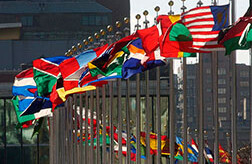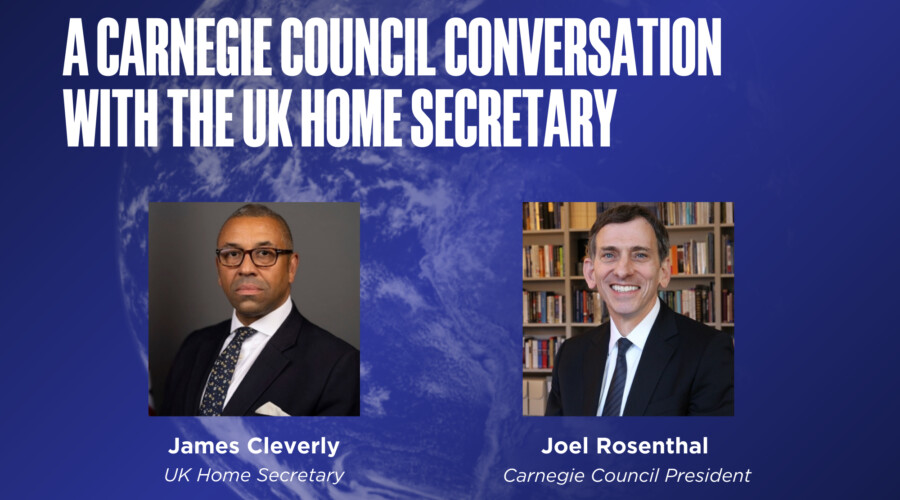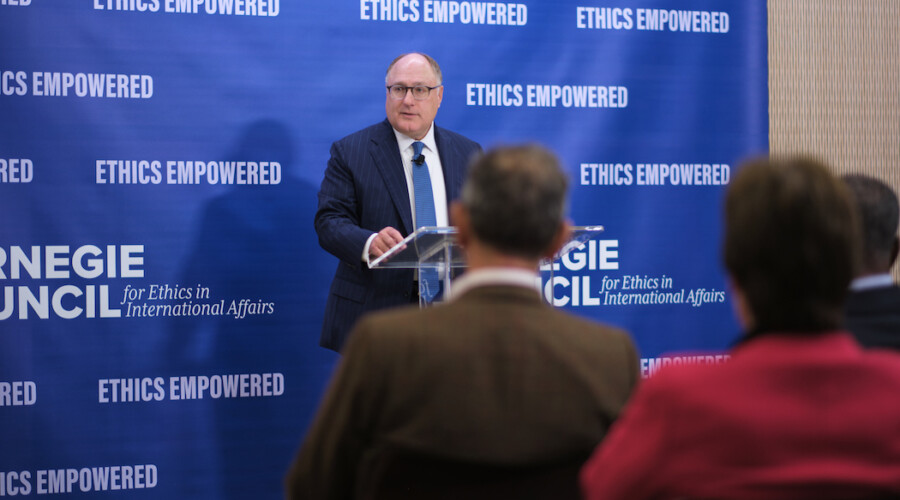Jacob Karlsson Lagerros is a 17 year-old high school student in Stockholm, Sweden. "I am both in love with and yearning to escape the vast wasteland of postmodernism. My life is a pursuit of ideas, knowledge and truth—or whatever takes their place if none of them exist."
Essay Topic: In your opinion, what is the greatest ethical challenge or dilemma facing the planet?
Learning to Cooperate When We're Poles Apart
It does not matter if you see a storm coming if you cannot run away from it. Climate change is not the world's greatest challenge. Neither is relentless fanaticism, global terrorism, or the international machine of capitalism grinding to a halt. It appears as if one should be justified in naming either as the most urgent dilemma; however, the real importance lies not in identifying the problems—but in solving them. The one thing all those global threats have in common is that they can be neither solved nor understood within the closed borders of a sovereign state. All of them require international cooperation. It is a shame then that modern civilization and international affairs all too often turn out a gathering of wild animals trying to communicate. As a collection of elephants screaming at cobras, snakes hissing at monkeys and bears roaring. To clarify: the enigmatic Austrian philosopher Ludwig Wittgenstein once wrote that "If a lion could speak, we could not understand him." He meant that human beings are barred from the world and ideas of lions since we share no common frame of reference. This is paralleled within human society as our cultural differences often provide incompatible frames of reference, disenabling fruitful cooperation. It is uncomfortably ironic that the Sri Lankan civil war was fought between the Liberation Tigers of Tamil Elaam and the Sinhalese people, who throughout history symbolized themselves as lions; that the eagles of the American government clashed with the Black Panther Party and that the financial crisis came out of an economical system labeling market changes as bears and bulls. The earth is teeming with an abundance of irreconcilable ideologies and radically diverse cultures, yet the international cooperation of those cultures is vital and inevitable. Thus, the greatest ethical dilemma facing the planet today is to learn how to be able to work together when our starting points are fundamentally different, to learn how to cooperate when our ideologies can barely coexist.
To solve this problem, the task of ethics in international affairs is to develop a theory of how to understand and communicate without having to coerce or threaten. For how do you determine who is right? How do you determine whose idea it is that should be taught to who? Developing this theory is a process far too arduous and complex to be done in this essay, and furthermore, if a fully developed theory existed our problem would not even be a problem in the first place. What we can do, however, is to perceive some of its essential ideas and concepts. It is important to note that racism, extreme nationalism, ethnocentrism and even sexism are all consequences arising out of our original dilemma—and by constructing our theory we by implication will construct a method for combating those consequences.
The current philosophical trend of postmodernism surely rejects every claim of absolute objectivity, and the immense pluralism of the earth's societies is quite a postmodern situation. In order to bridge cultural differences it is preferable to postulate as an axiom that "The absolute truth of an ideology might exist, yet in this context it lies beyond provability and may thus not be used as an argument" (notwithstanding the slight paradoxical nature of such a claim…). The humbleness of the old Socratic "All I know is that I know nothing" certainly would not hurt global ethics. Such humility would however be tremendously difficult to establish in any nation which is not a democracy. After all, the dogmatist bears that name for a reason. Is there even any basic notion that could be accepted by orthodox Judaists, North Korean communists and American liberals alike? In fact there is. Apart from the postmodern notion, there are two vital propositions that have to—and most importantly, can be—accepted by every nation in order to enable collective work towards a better future:
1. The planet is facing serious problems that have to be solved immediately.
2. These problems can only be solved through international cooperation.
If these propositions are accepted, the first foundations for a cross cultural/political bridge are laid. Why are these propositions easier to accept than our first one? Because the imminent danger signaled in the first concerns practically every nation, and a nation furthermore risks more in denying it and being wrong than in affirming it and being wrong. It is not optimal (perhaps not even moral) to cooperate with totalitarian states, but either we first eliminate every instance of totalitarianism and then cooperate with the resulting countries or we begin cooperation immediately. Our choice in this situation is obvious, since the solving of none of these problems can be postponed. Global warming will not take a break and wait for us to finish discussing politics.
The major ethical challenges lie in proposition 2. Firstly, if there were states that would still refuse to accept it, how do we make them? And secondly, how do we perform the cooperation once the proposition is accepted? These two challenges are variations of our original problem—i.e. how we spread ideas without causing aggressiveness and conflict—and are therefore largely resolved with the same methods. It will be assumed here that both of these propositions are true (I contend that when it comes to climate change, terrorism and global warming this truth is self-evident), and thus that any resistance would be based merely on political reasons. The first situation is resolved through the spread of knowledge and education (obviously not to the politicians who cause the situation, but rather to the people who chose those politicians) by making the general public aware of the help they need and the help they can give. As an individual, this task may be performed on a grass-roots level. Social media enable unprecedented ways of communication and spreading ideas—as long as one remembers to discuss and not to preach. The Arab Spring demonstrated how the organizational and information spreading power of social networks, which at first seems merely to be an apt way of organizing parties, can be a lethal weapon for razing autocracies. The role of countries is to act through acts of traditional diplomacy, yet in this situation governments will not be able to play a large role. The dominant actor possessing the ability to effect here is non-governmental organizations (NGOs), who can change the public view through distribution of literature and journalism, creation of educational programs, and support of emerging domestic organizations. Even more importantly, those actions would all contribute towards a cultural understanding, the cornerstone of cross-border collaboration.
However, there are certain issues involved in deliberately attempting to "help" another country. It risks turning into what Rudyard Kipling describes as "The White Man’s Burden," in an eponymous poem from 1899—an ethnocentrism where others nations are treated childlike and inferior. We once again have to make sure to discuss, not to preach. We have to regard the people we encounter as our equals, as people who share our endeavor and with whom we can join forces—not as naïve, poor and destitute figures craving aid.
To conclude, today’s major ethical dilemma is to learn how to cooperate when our ideologies can barely coexist. This cooperation must be achieved through overcoming cultural differences and spreading tolerance and understanding. The first step towards overcoming these differences is for every nation to realize that if the arduous struggles facing the modern world are to be resolved, it is dependent on all other nations and all other nations depend on it. The second step is taken through education, experience and knowledge. To spread civilized discussion, literature, and thinking is to settle for a world where ideas are approached with an open mind, which is a world were international issues can be resolved independent of the heritage of the discussers. It is a world where the age of the environmentally conscious, respectful cosmopolitan slowly succeeds that of the narrow-minded, prejudiced provincial. There is a story which beautifully demonstrates this notion. During the colonization period of the 19th century, a British man traveled to Australia and encountered an aboriginal woman. At first, they both stood silent with their stares piercing into each other. Then the woman gently spoke: "If you come only to help me then you can go back home. But if you consider my struggle as part of your struggle for survival, then maybe we can work together."



